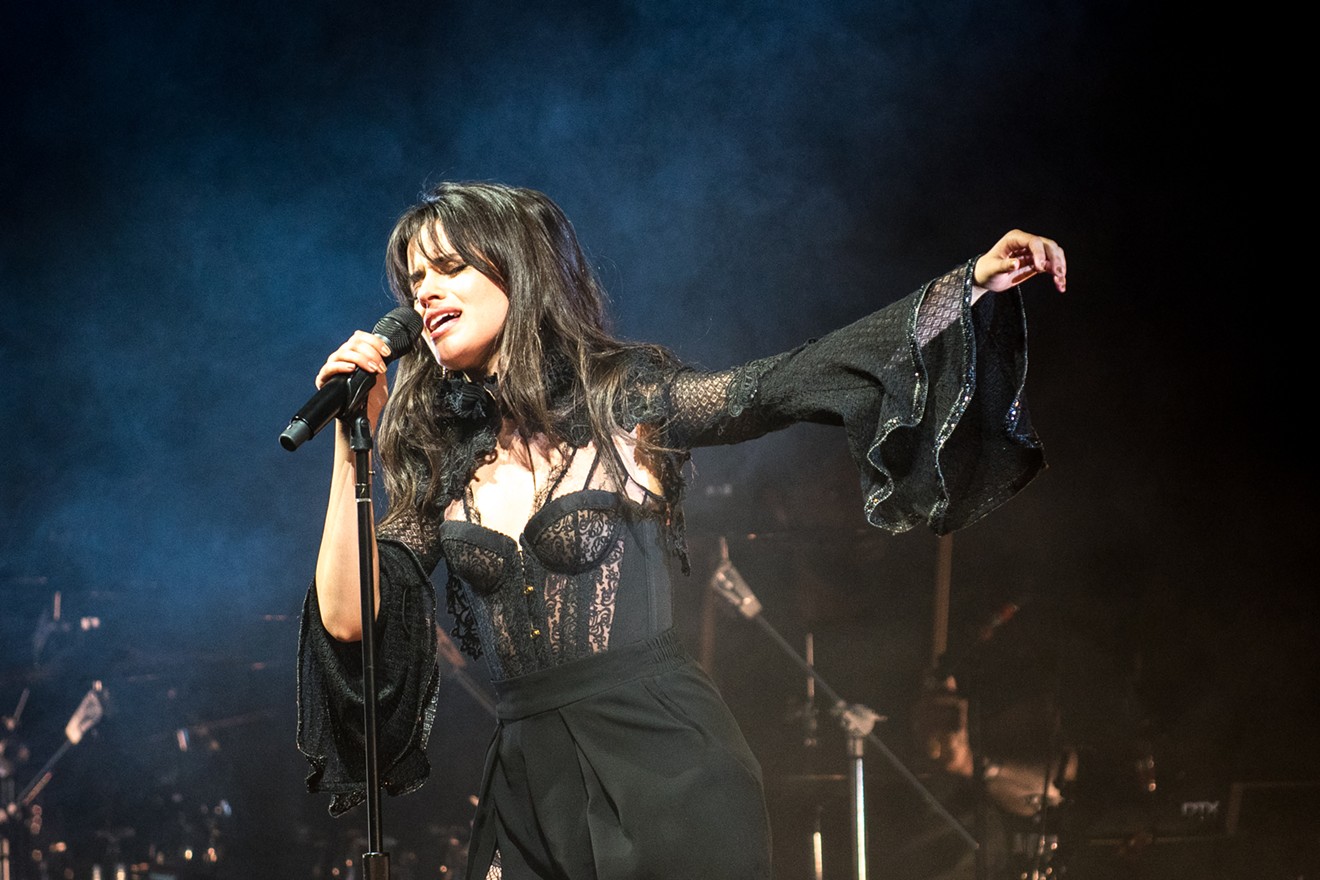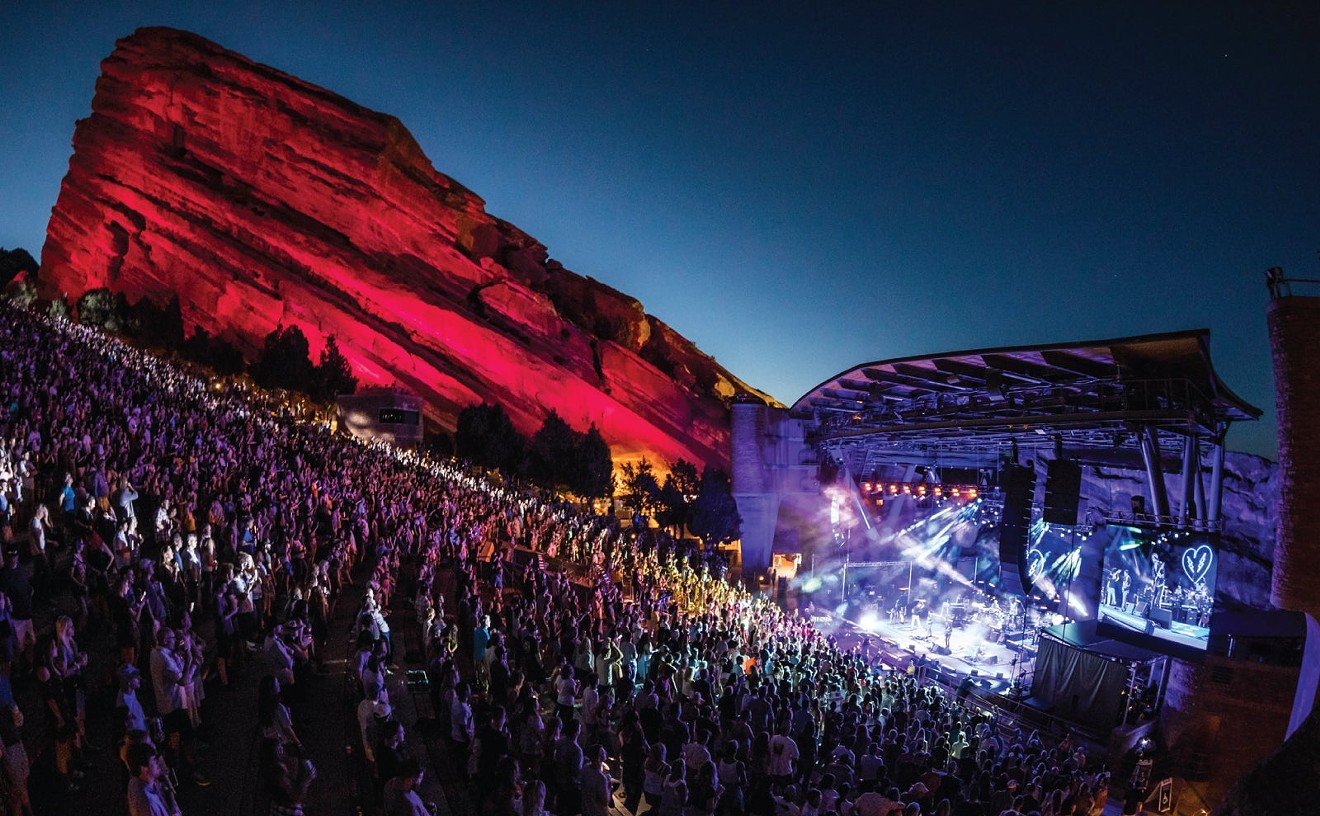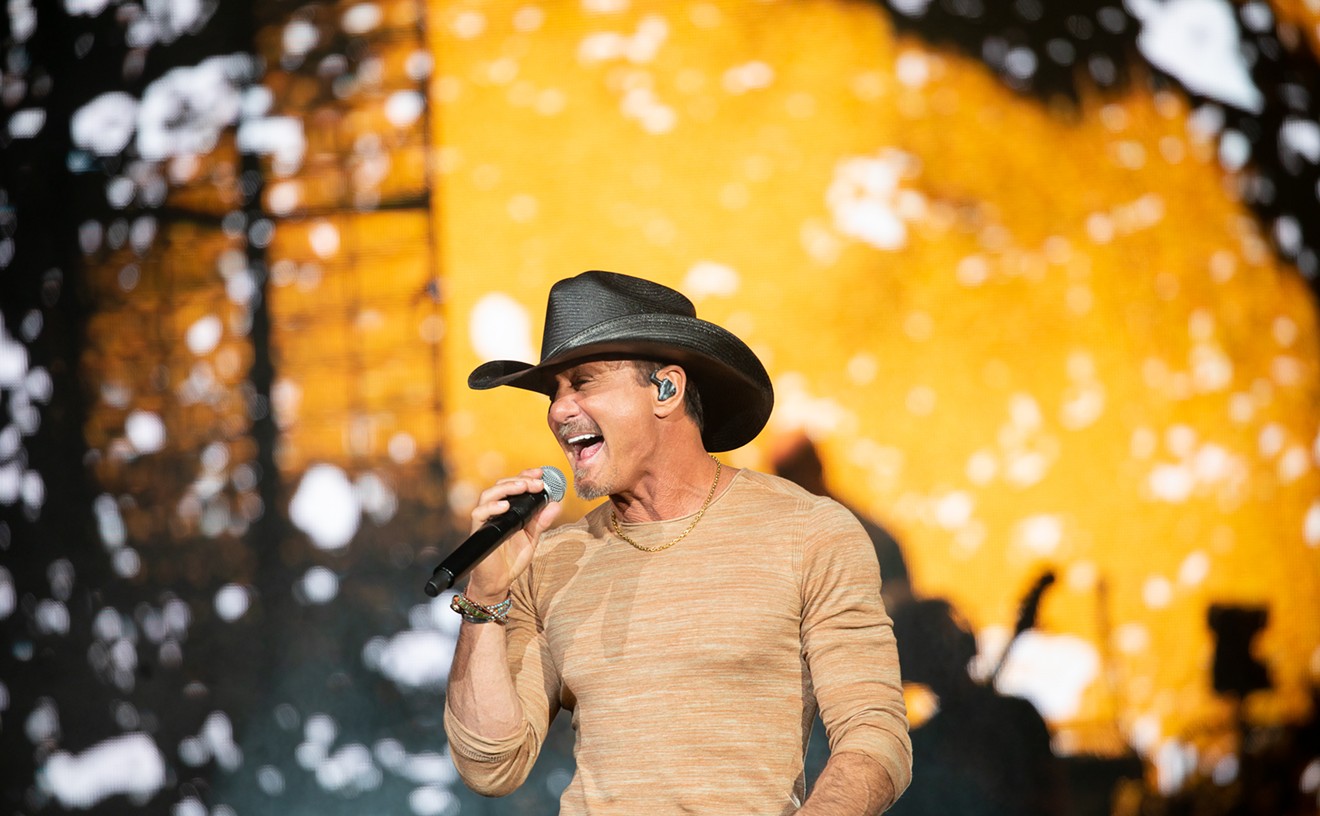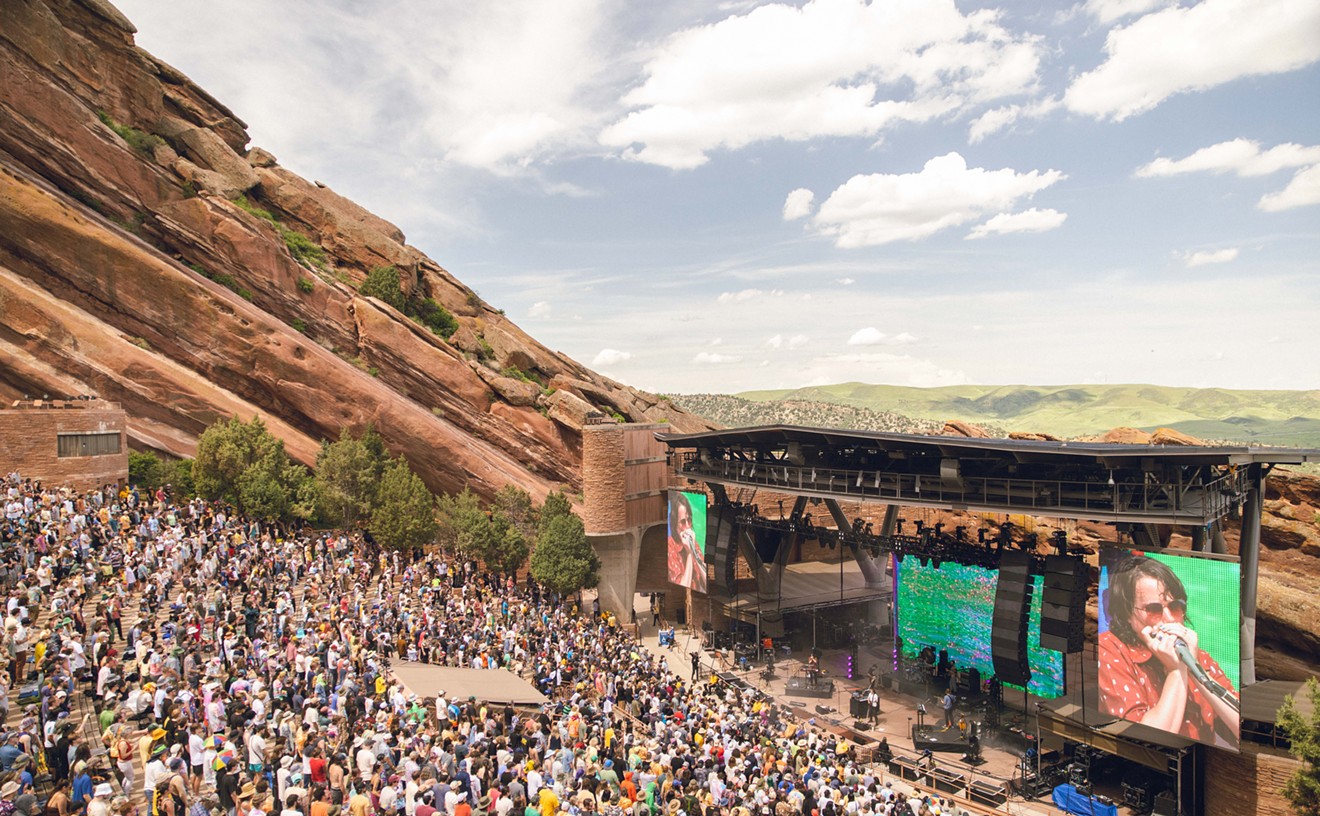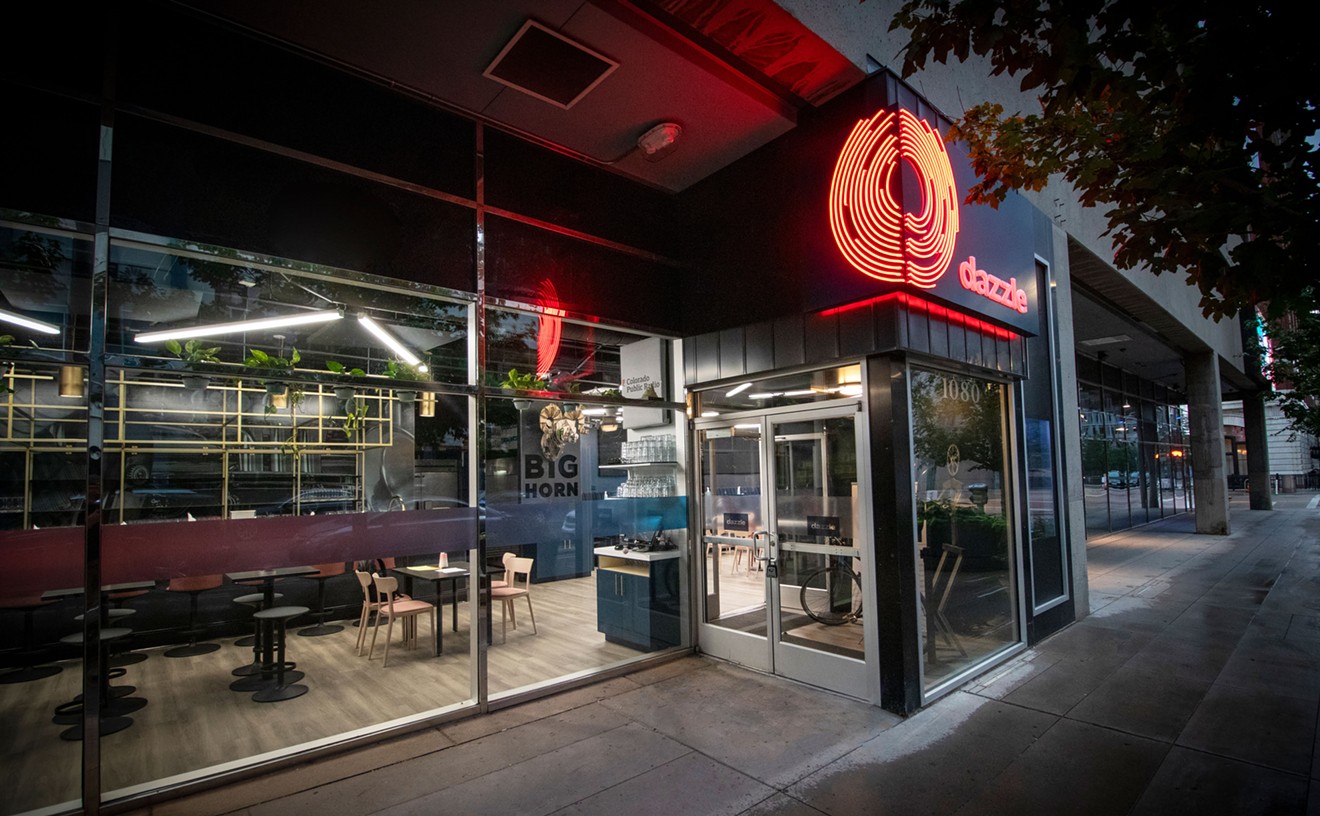Panicked schoolgirls begged their mothers to abandon the endless restroom line at Denver's Paramount Theatre on Wednesday, April 18, not wanting to miss the opening moments of Camila Cabello’s concert. Some pleaded in English, others in Spanish. Just like the rising pop sensation’s music, the crowd was bilingual and tangled in obsession.
Outside the concert hall, older fans shifted nervously, waiting to snag a bright-yellow pullover hoodie with the letters NBTS, which stand for Never Be the Same, the name of the tour and the first song off the artist’s debut solo album, Camila — a song in which Cabello likens obsessive love to heroin, morphine and amphetamines. Once people started donning the hoodies, the crowd began to look less like concert-goers and more like school-pride-infected students at a homecoming pep rally.
The chairs at the Paramount are painfully close together, offering little in the way of legroom. Next to me sat a massive, gruff young man with a hat pulled over his eyes, giving off a don’t-tread-on-me-militia vibe. He didn’t say hello, even though our bodies were touching. Nobody sat on the other side of him. He was a lone wolf, waiting for the show, and I couldn’t help but worry why he was there, in an ocean of teenagers.
I felt some relief that we had all been wanded down with metal detectors, because with good security, the chances that he might open fire were remote. I'm never quite able to shake the Las Vegas shooting and the bombing at the Ariana Grande concert from my mind whenever I’m at a big show — and that kind of anxious thinking softens my gripes about metal detectors and security checkpoints at venues. Unchecked, this attitude could quickly devolve into the sort of paranoia that fuels police states.
The moment the lights went dark, though, it was obvious my toxic fear was unfounded: The man was the first to jump to his feet, whistling, cheering and dancing. Throughout the concert, this superfan posted images of himself grinning and Cabello performing on his Facebook page, all while singing along to every song and obeying her every command. Hands up. Why not? Stomp your feet. Whatever you say, Camila.
I first paid attention to Cabello on New Year’s Eve, when Barack Obama announced on Facebook his list of his favorite songs of 2017. The first pick was “Mi Gente,” by J Balvin and Willy William; the second was “Havana,” by Cabello. Both choices showed the former president's fine taste in music, as his yearly lists typically do. But these two particular songs were subtle and savvy jabs at the Trump administration’s anti-immigrant/anti-Cuba stumping, and a strong statement about the former president’s admiration for immigrant youth of color. The songs were picks for the DREAMers, undocumented people who'd immigrated to the United States as children, people the Obama administration had tried to fight for, despite that president's simultaneous deportation efforts.
“Havana,” in particular, is a meditation on migrating from one country to another and the strains that puts on love. The song is catchy, with an overwhelmingly simple hook, “Havana, oh na na,” that sticks to the brain like a barnacle. It’s Latin-infused pop, a Billboard Top 200 chart-topper with endless rotation on Top 40 radio.
Cabello’s career started years before “Havana.” She got her big break at fifteen, on The X Factor, and through that joined the five-woman act Fifth Harmony, which sang wildly popular songs like “Work From Home” and “Worth It.” The music was predictable pop. When she struck out on her own, Cabello's bandmates announced that she had left the group, which she denied, and the high-profile breakup was messy, leaving many to wonder if her ego had gotten the best of her.
Then “Havana” dropped in the summer of 2017. Cabello’s song was shaped by her own story of migration, which was beautifully chronicled in January by Reggie Ugwu in the New York Times. In short, Cabello was born in Havana and grew up traveling between Cuba and Mexico. At age six, she and her mother migrated to Miami, where her father joined them later, both of her parents earning a living through squarely working-class jobs.
While Fifth Harmony’s sound is gratingly corny U.S. pap, “Havana” is infused with sounds from Cabello’s home country, with a wider, multinational view of what American pop music is becoming — music not just of the United States but of the Americas as a whole. If Trump’s election signaled a resurgence of white nationalism, the popularity of “Havana” proved that a younger, vibrant, immigrant-driven vision of U.S. culture was competing with the Republicans' white myopia. Her song was joyful, offering dreamers and immigrant youth hope in the face of xenophobic terror from the top.
Cabello’s not alone in the pantheon of pop stars making music as a balm for the oppressed amid the unsettling rise of the racist right. Lady Gaga, Kesha and Katy Perry have all offered their open-armed embrace to marginalized communities. But having an immigrant pop star deliver the message was more significant than the pandering of benevolent white liberals: Cabello's music is part of a radical rupture in who has the power to take the mic, what kind of music dominates dance floors and radio channels, and whose melodies and rhythms define the current cultural moment.
When news broke that Cabello would be dropping her debut solo effort, many looked forward to more danceable numbers like "Havana," drawing from Latin and hip-hop but anchored in pop. But she delivered a quieter, more introspective selection of songs than anybody would have expected. They addressed drugs, sexual domination, liberation from abusive relationships, emotional scars and a host of mental health issues. Some were bilingual. All were catchy. Those songs brought fans into her raw emotional life, and she, in turn, tapped into their own insecurities, consoling them through her willingness to bare her soul, a perfect recipe for appealing to struggling youth.
At her Denver concert, Cabello talked about the challenges of sharing her inner scars with listeners. And while she wanted to connect with the crowd on that point — which any fan with a soul already has done, blasting her songs on repeat — many in the audience wouldn’t shut up and let her speak. Instead, they screamed that they loved her, that she was beautiful and so forth — echoing sentiments she endlessly spouted at the audience.
Cabello's U.S. tour is scripted, and Denver's concert did not stray much from her L.A. and Vancouver shows. With relatively few songs, she plays a similar set list every night, opening with “Never Be the Same” and closing with “Havana.” Dramatic videos play between numbers, projections of layered imagery that could belong in a perfume ad or an avant-garde film. They show her posing and strutting, with pre-recorded voiceovers in which she waxes poetic about love.
Cabello has a talented bunch of dancers, who mix up ballet, hip-hop, jazz and modern styles, using their movements to tell stories throughout the set, and her energetic band plays flawlessly. Both multiracial crews offer an appealing window into what the future of the United States holds, a mixed-culture mashup made all the more joyful by Cabello's impeccable singing and her ceaseless, loving banter with the crowd.
During her set, Cabello mentioned that the songs she put together tell a story: It’s a story of love, survival and freedom from co-dependence and loss — a quest for control. While most of her songs could be lumped into the love-song genre, she’s quick to admit that their meanings change over time. At least one, “Something’s Got to Give,” has shifted from being a love song to a protest song. As she sang it in Denver, footage from March for Our Lives, anti-police-brutality and immigrant-rights protests played on the screen behind her. The audience, which included many youth of color, cheered along, visibly moved by Cabello’s show of solidarity with the movements their generation leads. When Stoneman Douglas High School student shooting survivor and gun-control activist Emma Gonzalez’s image graced the screen, the crowd’s cheers were deafening.
The audience knew the words to Cabello's songs — even “Sangria Wine,” a track with vocals from “Happy” singer Pharrell Williams, which she has been teasing during concerts and performed live with him in Los Angeles. There are only a handful of rough recordings of this song floating around on YouTube and one video with transcribed lyrics whose accuracy is dubious at best. Still, her Denver fans knew it, word for word and one hip-shaking beat to the next.
For one of Cabello’s saltier songs, “Real Friends,” in which she sings about her longing for friends who won’t let her down, she invited fans wearing “Real Friends”-inspired T-shirts to the front for an impromptu singing contest. People flooded the stage, and ultimately, Cabello picked an eight-year-old girl wearing puffy Mickey Mouse-style ears who was celebrating her birthday as the winner. Fans wept, seeing how sweet Cabello was to the kid. When the girl said it was her first time on a stage, Cabello assured her she was doing great.
If Cabello herself is wondering — and for someone whose lyrics can be as painful as exposed nerve endings, she must have some doubts — she's doing great. too. After she wrapped "Havana" and the lights came on, "Girls Just Want to Have Fun" blasted over the speakers. And while that song speaks to part of what Cabello is doing, as a solo artist she's offering the world so much more than a good time. In these bleak days, she dishes out an optimistic vision of the culture in which we live. Her music sharply contrasts with the bigoted doomsday cynicism of the country's leadership. She offers more than glitzy distraction: She’s building power in young people — girls in particular — all while pushing us to take care of ourselves and champion love over fear.
Those kids stuck in line with their moms, impatient to see their hero in person for the first time, get it: Cabello is using music to build up her fans' dignity in a world that robs them of it, giving youth a much-needed sense of control.
Cabello will be back in Denver on Friday, May 25, opening for Taylor Swift at Mile High.
[
{
"name": "Air - MediumRectangle - Inline Content - Mobile Display Size",
"component": "12017618",
"insertPoint": "2",
"requiredCountToDisplay": "2"
},{
"name": "Editor Picks",
"component": "17242653",
"insertPoint": "4",
"requiredCountToDisplay": "1"
},{
"name": "Inline Links",
"component": "18838239",
"insertPoint": "8th",
"startingPoint": 8,
"requiredCountToDisplay": "7",
"maxInsertions": 25
},{
"name": "Air - MediumRectangle - Combo - Inline Content",
"component": "17261320",
"insertPoint": "8th",
"startingPoint": 8,
"requiredCountToDisplay": "7",
"maxInsertions": 25
},{
"name": "Inline Links",
"component": "18838239",
"insertPoint": "8th",
"startingPoint": 12,
"requiredCountToDisplay": "11",
"maxInsertions": 25
},{
"name": "Air - Leaderboard Tower - Combo - Inline Content",
"component": "17261321",
"insertPoint": "8th",
"startingPoint": 12,
"requiredCountToDisplay": "11",
"maxInsertions": 25
}
]

